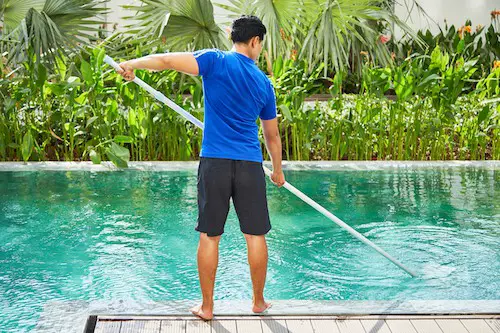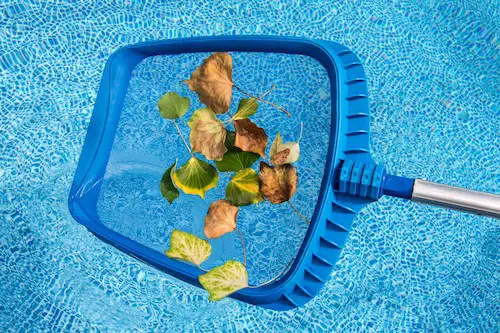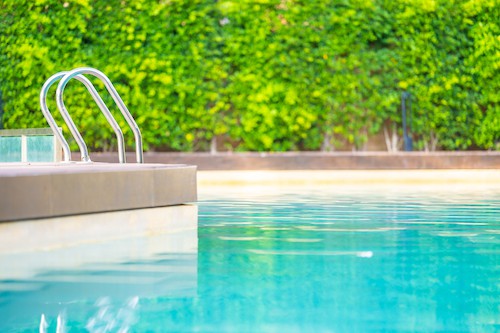How to Maintain a Pool in the Winter
While you may think that swimming pools only need maintenance during the summer season, it’s vital to care for your pool in the winter months too. If you’re not checking on your pool throughout the colder months, the pool could suffer from severe damage that won’t be discovered until it’s time to swim again. It’s important to be educated on the winter maintenance your pool will need so you can properly take care of your property.
How do you maintain a swimming pool in the winter? Here are steps to follow when it comes to taking care of your pool in the colder months:
- Regularly review your pool cover for damage
- Drain and store pool equipment
- Regularly check under your pool cover
- Prepare for freezing weather and what it can do to your pool
- Check the pool chemistry on a regular basis
- Monitor the water level in your pool
- Make sure the pool shell stays clean

By taking the time to maintain your pool during the winter, you can ensure that it will be ready for swimming when summer rolls around. To learn more about each point listed above, keep reading!
Regularly Review Your Pool Cover for Damage During Winter
Why do you need a pool cover during the winter? Pool winter covers help protect your pool from debris, algae growth, sunlight, and surface damage. If debris gets in your pool and is left there for a long period of time, it’s going to be a pain to try and clean. Too much debris can block up the pump that circulates the water.
Algae needs sunlight to live; by keeping a pool cover on your pool during the winter, you can prevent algae from taking over your pool. Sunlight can also affect the chemicals in the pool water, causing the PH to change. This can cause damage to the surface of the pool and the pool liner.
Pool covers are vital to the health and maintenance of your pool during the winter. You’ll want to regularly check on your pool cover to make sure it’s anchored down properly and there’s no damage to it. Debris will collect on the top of the pool cover; regularly remove this debris to see if the cover has been ripped or torn.
There should be a few inches of water on top of the pool cover. The water will help keep the cover from blowing in the wind. Check the weights to the cover as well to make sure your tarp is securely over the pool.
Drain and Store Pool Equipment to Prepare for Winter
To prepare for the winter, drain and store your pool equipment. This includes ladders, skims, vacuums, hoses, and any other pieces of equipment you have. If this equipment is left in the water or is stored with water in them, the water can freeze and cause the equipment to expand and break. You’ll want to remove the pool equipment before winter can hit; this will give you time to properly drain the equipment and store it properly.
There’s a debate about whether or not you should remove the pool filter and the pump motor. This equipment can be used to circulate the water during the winter to ensure bacteria doesn’t take hold and to keep the pool water from freezing. It’s important to note that this equipment can get damaged by freezing water. Do further research to determine your options and what you think you should do for your pool.

Regularly Check Under Your Pool Cover During Winter
Just because there’s a cover on your pool does not me you should refrain from regularly checking under the cover. By doing this, you may be able to avoid a pool disaster. Here are some things to look for when you check under the pool cover:
- Is there debris in the pool?
- Is the surface of the water covered with a greasy film?
- Does the pool liner still look clean and shiny?
- Are there any signs of algae in the pool?
The answers to these questions will determine your course of action. If your pool looks clean and healthy, then you don’t have to worry; however, if your pool is starting to develop some of these other signs, you may need to balance the pool chemicals or shock the pool to kill off the algae. Nonetheless, you’ll want to catch signs of chemical off-balance or algae growth early on before too much damage can be done.
If you notice that your pool does have a film on top of the surface, don’t worry. Check out our article, Pool With Film On Top: Simple Solution Guide, to learn what to do.
Prepare for Freezing Weather and What it Can Do to Your Pool During Winter
Before freezing temperatures hit, it’s important to know how to manage your pool in these conditions. Freezing water can burst pipes and cause serious damage to your property. Don’t wait until it’s too late; have a plan in place for when freezing weather hits.
During freezing temperatures, you should run your pool filter and pool pump 24/7. This will keep the water circulated, which will, in turn, keep the water from freezing. Plan on checking your pool throughout the day to ensure that everything is running smoothly and the equipment is keeping the water circulated.
Check the Pool Chemistry on a Regular Basis During Winter
If the chemicals in your pool are unbalanced, they can cause damage to the water and to the surfaces of your pool. While the pool cover will protect the pool from the effects of the sun, you will want to test the chemistry and the pH of your pool on a regular basis. Unbalanced chemicals in the water of our pool can damage the pool liner and the filter and pump.
Monitor the Water Level in Your Pool During Winter
During the winter, your area may receive a lot of rain or snow. When the snow melts, it can easily raise the water level in your pool. If the water is at a level that the pool can’t contain, serious damage can be done to the pool and the pool pump and plumbing. The water level can easily cause a burst pipe or other serious damage.
For this reason, it’s important to monitor the water level of your pool during the winter. It can be hard to remember to check water levels since your pool will always be covered, but regularly checking your pool can save you from a serious disaster. Have a plan in place if the water levels in your pool start to rise.

Make Sure the Pool Shell Stays Clean During Winter
The pool shell is the walls and the floor of your pool. It’s important to keep the pool shell clean to prevent bacteria and algae from growing. You’ll want to regularly scrub and vacuum out your pool during the winter. You can place your pool vacuum back in the pool to let it get the job done; however, you’ll want to take it out of the pool, drain the water from the vacuum, and store it to prevent the vacuum from getting damaged by freezing temperatures.
How Often Should You Check on Your Pool Throughout the Winter?
Once your pool has a pool cover on it, it can be easy to overlook it as you go about your day. You’ll have to be deliberate about checking on your pool throughout the winter months. A good rule of thumb is to check on your pool at least once a week. You should balance pool chemicals and run the pool vacuum at least once a week. During freezing temperatures, you may want to check on your pool every day just to make sure everything is working as it should and that the water is staying circulated.
When Should You Close Your Pool After the Summer Months?
When you close your pool after Summer is over is largely determined by the outside temperatures and the usage of the pool. If you live in an area where the temperatures stay warm late into Autumn, you don’t need to rush to shut down your pool. Once the temperatures get below 65 degrees Fahrenheit, then it’s time to start winterizing your pool and preparing for the colder months.
If you’re nervous about covering your pool too early in the season, just know that covering your pool won’t cause damage, even when it’s hot outside. The pool cover can actually keep water from evaporating out of the pool. If you do close your pool earlier in the Autumn season, be sure to follow your normal maintenance routine.
Maintaining a pool both in the summer and the winter months can be a lot of work. If you’re short on time or don’t have the knowledge to properly maintain your pool, consider hiring a pool maintenance company.
